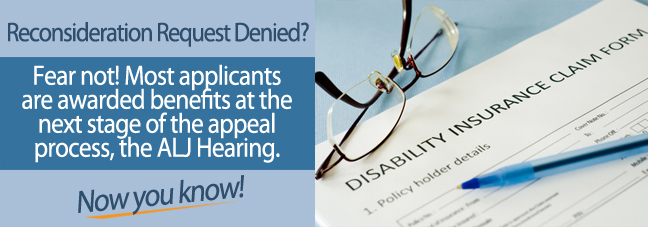The Social Security Administration’s (SSA’s) disability programs give disabled individuals and their families the necessary funds to go on with everyday life, even when illness or disability prevents income from employment.
Benefits come in two forms: Social Security Disability Insurance (SSDI) and Supplemental Security Income (SSI) and each program has unique qualification rules. This means you can be approved for one program but be denied benefits through the other. Either way, if your disability stops you from working, you may have no choice but to fight for the benefits you and your family need.
Learn More: Appealing After A Denial
The Reconsideration Review Stage of a Disability Claim
If you were denied at the initial review stage, then you received a notice in the mail from the SSA explaining that you did not qualify for benefits. This notice also gave you the chance to request a reconsideration of your claim.
When you requested a reconsideration, you formally asked the disability examiner assigned to your claim to take a “second look” at your records and application. During the reconsideration, the SSA also reviewed any additional medical documentation or other new evidence you submitted to support your claim for benefits.
At this review stage, your application, medical records, and any new evidence you submitted were once again compared with Blue Book disability listings, just like when you first applied. If your disability worsened since you submitted your original application, then the SSA may also have needed more information from you about your everyday physical or mental limitations. If so, then the disability examiner may have sent you and your doctor new “functional report” forms to complete.
Denial and Approval Rates
Receiving a denial at the reconsideration stage isn’t at all uncommon. In fact, only about 24 percent of disability applicants are approved when the SSA takes a second look at their claims. Unfortunately, this means chances are high that you’ll have to proceed to the appeals stage, if you plan to continue to try to get benefits.
Although denials can happen for a range of reasons, the most common by far is the lack of medical evidence proving disability. Work closely with your doctor to ensure your medical history is thoroughly documented and that all your medical records are shared with the disability examiner that reviews your claim for benefits.
What to do if You’re Denied
If you’re denied for medical reasons, then you have the ability to file an appeal. During your wait for an appeal hearing, you’ll want to prepare for your appearance before the administrative law judge (ALJ) who will review your claim. You will also need to collect as much new medical and other evidence as possible during this time. New evidence should ideally be sent along to the appellate court before the hearing as well.
A disability attorney or advocate can help you file your appeal, assist you in preparing for your hearing, and in gathering additional evidence. He or she can also represent you before the ALJ and advise you on the appeal hearing process, potentially increases your chances of approval for disability.
